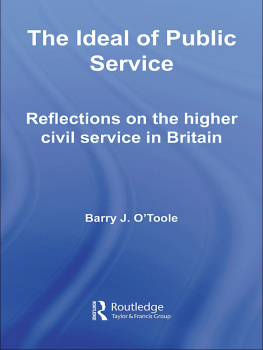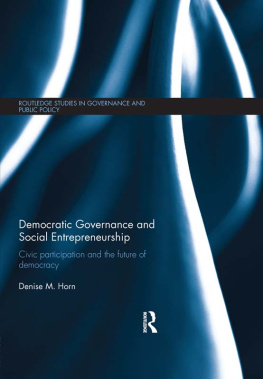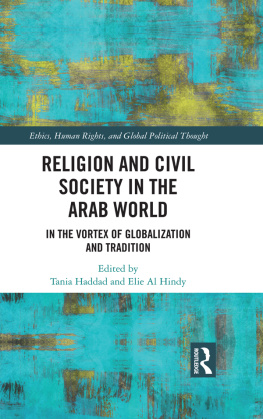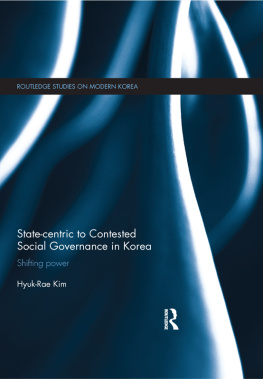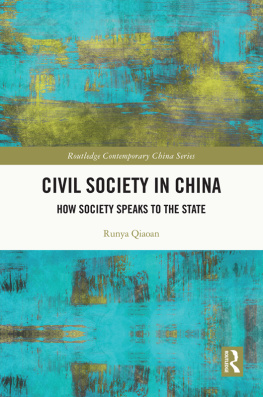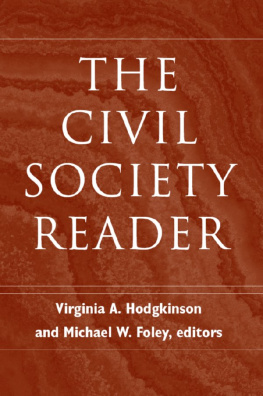Public Sociology and Civil Society
Public Sociology and Civil Society
Governance, Politics, and Power
Patricia Mooney Nickel
First published 2012 by Paradigm Publishers
Published 2016 by Routledge
2 Park Square, Milton Park, Abingdon, Oxon OX14 4RN
711 Third Avenue, New York, NY 10017, USA
Routledge is an imprint of the Taylor & Francis Group, an informa business
Copyright 2012, Tayor & Francis.
All rights reserved. No part of this book may be reprinted or reproduced or utilised in any form or by any electronic, mechanical, or other means, now known or hereafter invented, including photocopying and recording, or in any information storage or retrieval system, without permission in writing from the publishers.
Notice:
Product or corporate names may be trademarks or registered trademarks, and are used only for identification and explanation without intent to infringe.
Library of Congress Cataloging-in-Publication Data
Nickel, Patricia Mooney.
Public sociology and civil society : governance, politics, and power / Patricia Mooney Nickel.
p. cm.
Includes bibliographical references and index.
ISBN 978-1-59451-976-5 (hardback : alk. paper)
1. SociologyPhilosophy. 2. Applied sociology. 3. SociologyMethodology. 4. Civil society. I. Title.
HM511.N53 2012
301.01dc23
2011030057
Designed and Typeset by Straight Creek Bookmakers.
ISBN 13 : 978-1-59451-976-5 (hbk)
ISBN 13 : 978-1-59451-977-2 (pbk)
Contents
I would like to express my gratitude to Ben Agger, Chamsy el-Oljeili, Timothy W. Luke, and Barry Smart for their generous and engaged dialogue as this project evolved. Thanks to Angela M. Eikenberry for her support of my critical views on governance and with whom I have a long-standing dialogue about civil society. I am grateful to the students in my honors seminars held at Victoria University of Wellington 20082010 for their humor and unique perspective on the topic. Perhaps more importantly, they demonstrated to me that students of public sociology, civil society, and governance are not only perfectly capable of understanding these topics through the lens of critical theory; they want to do so and often do so better than the authors with whom these concepts originate! My research assistant, Florence Fudakowska, did an excellent job of navigating the ins and outs of bibliographic presentation. Thanks to Ed Nickel for all of the little things that make a huge difference. Dennis Smith was the first editor to give my ideas about public sociology a thorough review, and I am very grateful to him for this. Finally, I want to thank Dean Birkenkamp for his patience and for supporting an interdisciplinary project.
Public Sociology and Civil Society in the Context of Governance
This is a book about public sociology only by way of an access point; through the lens of public sociology, it is a book about the contemporary practices of governing. Public sociology responds to significantly more than sociologys relationship with the public. Over the past ten years the phrase public sociology has been used to refer to efforts to build civil society (Burawoy 2005a), the management of nongovernmental organizations (NGOs) (American University 2007, 2010), program evaluation (Humboldt State University 2010), cosmopolitan state management (Beck 2005b; Delanty 2006), social gerontology (Putney, et al. 2007), and government policy consultancy (Perrucci, et al. 2008). Whether they involve the governing vocabulary of democratic ideals or the practice of knowledge, the circulation of these multiple meanings is a technique of governing.
In considering public sociology, civil society, and governance together, I want to understand the kinship between the lines of inquiry and the proximity of those who undertook them (Foucault 1998, 439). My aim is therefore to explore the politics of academic disciplines, knowledge, and discourse as they have emerged within the recent debate over public sociology, while also highlighting how this debate has become intertwined with civil society and what has been hailed as an age of radically democratic governance (Srensen and Torfing 2005a). What does it mean to practice knowledge publically and to govern democratically? How are these two activitiesthe production of knowledge and governingrelated?
I understand public sociology, civil society, and governance to be interrelated terms that have as much potential to become sites of disciplinary discourse as they do to become sites of radical politics. In advancing this argument I assume that knowledge and its organization are political. Knowledge production by intellectuals is political in the sense that it can be viewed as a powerful means of either stabilizing or challenging the patterns according to which people live their lives, be they patterns of ideas, expectations, governments, economies, or so-called laws of society. The organization of knowledge is political in the sense that it is situated within universities, which are not distinct from the state or the economy and associated demands for the production of instrumental knowledge (Apple 1993, 2003; Aronowitz 2000; Barrow 1990; Luke 2005). This is to say, first, that the pursuit and organization of knowledge involve deliberate choices made by individuals with preferences about how the world should be understood, and, second, that these choices are significantly influenced by the requirements of governing and the knowledge economy within which intellectuals are situated.
A central impetus for this inquiry is my observation of the recent widespread and often intersecting circulation of phrases like public sociology, civil society, and democratic governance within varying academic disciplines, as well as within the varying institutions of practice where public service now takes place. The contemporary call for public sociology, because it explicitly references civil society and governance, provides a starting point for untangling these concepts.
Public sociology in its early conception described a style of intellectuality involving dialogue between sociologists and the publics with whom they were concerned. Beyond this broad framing, what type of dialogue, with what purpose, which publics, and the functions of intellectuals and the knowledge they produce in relationship to civil society and the state are now widely contested. The label public sociologist as a descriptor of public intellectuals within the discipline of sociology originates as early as Herbert J. Ganss 1988 Presidential Address to the American Sociological Association (ASA), titled Sociology in America: The Discipline and the Public. Drawing on Russell Jacobys (2000) notion of the public intellectual, Gans (1989) specifies that public sociologists are not popularizers of sociology, but rather they are empirical researchers, analysts, or theorists like the rest of us, although often their work is particularly thoughtful, imaginative, or original in some respect (7). For Gans, public sociologists share three traits. First, they enjoy the craft of writing and are therefore particularly adept at conveying complex ideas. Second, they have broad sociological interests; they understand the world outside of narrow disciplinary boundaries. Third, they avoid undue professionalism (Gans 1989, 7). Echoing Ganss concern about the impact of the professionalization of knowledge on public life, in his 2000 Presidential Address to the ASA, titled Social Justice for Sociology: Agendas for the Twenty-First Century, Joe Feagin (2001) argued for a sociology that addressed major public problems: creating and ensuring the processes of a truly democratic participation in decision-making (5).


